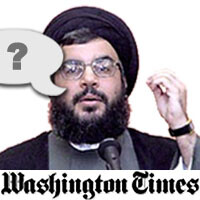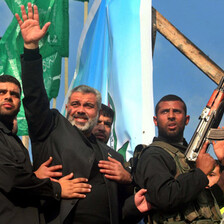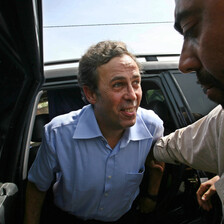The Electronic Intifada 13 December 2002

Washington Times assertions helped change Canada’s policy towards an organisation that is widely recognised for its humanitarian contributions in desperate areas of the Middle East. That the reports later turned out to be false apparently doesn’t seem to matter.
Hizbullah’s military wing has been banned in Canada since 2001, but up until Wednesday, it was still legal to contribute to the social arm of the organisation.
“This decision is made on the basis of sound criminal and security intelligence information and in no way is due to political pressure from anywhere,” insisted Wayne Easter, Canada’s Solicitor General.
Easter felt compelled to put it this way for the very reason that adding Hizbullah to lists of “terrorist” organisations has long been a noisy and overt goal of pro-Israeli groups in North America.
Indeed, pro-Israeli organization B’nai Brith Canada had launched an action last week in the Federal Court of Canada in a bid to force the government to declare Hizbollah a terrorist organization.
Prior to the ban, Canada’s official position has long been that the social/political wing of Hizbullah was doing good, charitable works in the Middle East. Few dispute the beneficial nature of the massive network of medical, educational, and charitable services provided by Hizbullah in some very desperate areas lacking any other sources of social support.
Indeed, just ten days earlier, on 1 December 2002, Easter commented to CTV News in an interview on CTV’s Question Period that “If I came forward with listings just basing it on headlines and not doing the proper research, you people would be asking me ‘What about civil liberties, what about due process?’ and you’d be right to do that.” (“Cdn Jewish, Arab groups at odds over Hezbollah”, ctv.ca, 2 December 2002)
So what “sound criminal and security intelligence information” surfaced and what process took place in the ten days between December 1st and December 11th?
None did. Apparently a single, initial media report on December 4th was sufficient.
Many Canadian newspapers and politicians — and indeed international media organisations including Reuters and the Associated Press — have widely cited the ultimate deciding factor for Canada’s policy change towards Hizbullah to be statements by its leader Hassan Nasrallah last month in which he allegedly urged Palestinians to undertake additional suicide bombings in and outside of Israel/Palestine, in locations around the world.
Canada puts total ban on HezbollahIt has become accepted wisdom that Nasrallah allegedly made some sort of call for more suicide bombings not only inside Israel, as Reuters describes above, but also internationally.
Reuters, 12 December 2002.OTTAWA - Canada slapped a total ban on Hezbollah yesterday after the group urged Palestinians to carry out more suicide attacks in Israel.
Hezbollah’s military wing was banned by Canada in late 2001. However, for several months, Ottawa resisted pressure to outlaw the group’s political wing, which Foreign Minister Bill Graham described as a legitimate political and social movement.
But the government changed its mind after Hezbollah leader Sheikh Hassan Nasrallah was quoted as urging Palestinians to ignore international criticism of suicide attacks and keep up their armed struggle against Israel.
The decision means Canada has taken a harder line on Hezbollah than allies such as Britain, which banned the movement’s military wing 18 months ago but still recognizes the political wing.
Ottawa has been under increasing pressure from Jewish groups and the official opposition Canadian Alliance party to ban Hezbollah outright. Last month, the B’nai B’rith organization launched a lawsuit against Ottawa on the issue.
Under the ban, Hezbollah’s assets can be seized, and any person who handles the finances or the property of the group faces a sentence of up to 10 years in jail.
An Associated Press report of December 11th noted that, “Recent statements attributed to a Hezbollah leader called for expanding terrorist attacks outside the Middle East. That convinced Foreign Affairs Minister Bill Graham to ban the entire organization.” (“Canada Adds Hezbollah to Banned Groups”, Tom Cohen, Associated Press Writer, 11 December 2002).
The effect of the initial reports was dramatic. “The [government’s] defence completely fell apart last week,” declared Bill Rogers in the Ottawa Sun, “when the leader of Hezbollah, Sheik Hassan Nasrallah, encouraged Palestinians in a speech in Lebanon ‘to take suicide bombings worldwide.’” (“Canada takes aim at Hezbollah”, 12 December 2002).
Keith Landry president of the Canadian Jewish Congress was quoted as saying that “Nasrallah confirmed what we, and others, have been telling the government all along, Hezbollah is one of the most dangerous international terrorist networks in the world. Their fundraising, recruitment and operations - including a significant Canadian-based component - have a long global reach.” (“Social wing of Hezbollah raised money for terrorism, says Solicitor General”, Canadian Press, 11 December 2002)
In the same article, Canadian Foreign Affairs Minister Bill Graham expressed the government’s understanding as now being that Hizbullah “still does (humanitarian) works, it still does hospitals, it does things but it was clear from the leader’s comments the other day that, in fact, it was not distinguishing itself from terrorist activities.”
However, an excellent Canadian Broadcasting Corporation (CBC) report by CBC journalist Neil Macdonald, has uncovered the surprising reality that the alleged remarks were not made by Hizbullah leader Nasrallah at all. Here is a transcript from the 11 December 2002 CBC broadcast:
PETER MANSBRIDGE: Well now to that crucial quote, the one that helped kick-start the change in Canadian policy and attributed to Hizbollah’s Sheikh Hassan Nasrallah. The CBC’s Middle East correspondent Neil MacDonald went to Beirut to investigate what was said and what was not. Here’s his revealing report.A Toronto Star report on December 13th offered more detail of CBC reporter Neil Macdonald’s findings. Macdonald, the article reported, who traveled to Lebanon to investigate:NEIL MACDONALD (Reporter): This unremarkable cleric enjoys legendary status in the Arab world. The man whose fighters drove Israel out of Lebanon. Israel and its supporters, though, regard Sheikh Hassan Nasrallah of Hezbollah as a cold-blooded terrorist and say his own words have now provided the proof. Certainly the quotes attributed to him last week and reported widely in most Canadian media were ominous. “Suicide bombings should be exported outside Palestine”, he was reported to have said. “I encourage Palestinians to take suicide bombings worldwide, don’t be shy about it.” Canadian Jewish groups and their allies immediately pressed their demand that Canada classify Hezbollah as a terrorist group. Ottawa resisted doing that, given that Hezbollah also runs a social network with projects like this one which retrains and offers work to disabled Lebanese. Hassan Nasrallah’s heavily reported new quotes merely had an impact. The only problem is there is simply no evidence Hassan Nasrallah ever made a speech promoting global suicide attacks. There is no record of such a speech here, and there would be. It was not broadcast on Hezbollah’s television station, as was reported. Hezbollah, which vigorously publicizes Nasrallah’s every word, says the remarks were never uttered and the Canadian embassy in Beirut has tried and failed to document the quotes. The story originated not in the Middle East but in London, with this man. Paul Martin freelances for “The Washington Times,” a right wing newspaper owned by the Unification Church. He cannot back up the quotes his story attributes to Nasrallah. Nevertheless, he believes he understands Nasrallah’s true agenda.
PAUL MARTIN (The Washington Times): Nasrallah said we look at America as the enemy of this nation. He then adds, we will fight the enemy or them anywhere and everywhere and says that we need to work on the culture of suicide missions.
MACDONALD: There is nothing new in Nasrallah’s support for Palestinian tactics in the occupied territories and in Israel. Just recently, Nasrallah praised Palestinians he says are, quote, “willing to sacrifice themselves fighting Israel with whatever weapon”, suicide bombs included. But, says Hezbollah legislator Mohammed Raad, Nasrallah has specifically instructed that Hezbollah’s fight with Israel is military in nature and not to be taken outside the region. Raad says “The Washington Times” story about exporting attacks as part of a propaganda orchestrated by America’s pro-Israel right wing. Indeed, there does seem to be a theme to “Washington Times” stories. Earlier this year, the paper ran a report by a reporter named Sayed Anwar accusing Palestinian Muslims of raping, executing and extorting Christians in Bethlehem. When the story was questioned, Sayed Anwar turned out to be a fictitious name. A composite for Paul Martin and two of his researchers. Martin refused to discuss that incident on camera. Ottawa now knows that the Nasrallah quotes in the “Washington Times” about exporting suicide attacks were almost certainly never uttered. Of course what this all really boils down to is the old question of what constitutes terrorism. Is Hezbollah a national liberation movement or, as Israel and its supporters maintain, a murderous global menace? To a great many people in this part of the world, to label Hezbollah a terrorist organization is to choose sides in the defining conflict of the Middle East, an intensely political decision for any government. Neil MacDonald, CBC News, Beirut.
“…could not make the facts fit with Martin’s account of them. Not only did Nasrallah not make the speeches when and where Martin had reported, there was no evidence the Hezbollah leader had ever incited suicide bombers to go global.Of course, a simple Internet search for Walid Phares quickly identifies him as a pro-Israeli Lebanese ultra-nationalist activist who has contributed policy briefs to the Middle East Quarterly, the publication of Daniel Pipes’ well known think tank, the Middle East Forum.“I watched the videos. I watched the speeches. I have done more research than maybe the Canadian government has done, certainly more than Paul Martin has done,” Macdonald told me on the phone from Jordan last night. “He came up with three quotes, one of which, to be charitable, was a gross mistranslation, and the other two were never even uttered.”
When CBC confronted Martin for Wednesday’s edition of The National, he “got very upset and jumped up and said this interview is over.” Eventually, he fingered Walid Phares, a Florida Atlantic University associate professor, as his source.”
Source: Curious silence greets discredited Hezbollah tale, Antoinia Zerbisias, Toronto Star, 13 December 2002.
Once again, as in the case of statements falsely attributed to Palestinian Authority officials in the wake of the Israeli war crimes in Jenin, we must note that a “Chinese whispers” effect in the media has produced a massive real world ripple with negative consequences for a series of medical and educational facilities that are widely considered to be beneficial.
The source? A journalist who has previously propagated false information under a false indentity, who works at an irresponsible newspaper that refuses to hold him accountable. His source? A “Middle East Expert” who holds clearly partisan views.
Once again, fact checking is exposed as a seemingly insurmountable problem for media organisations covering the Middle East.
Nigel Parry
Nigel Parry is one of the founders of the Electronic Intifada.
Related Links:





